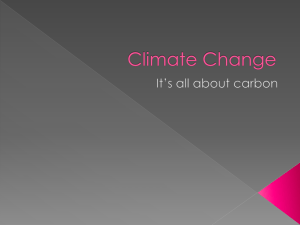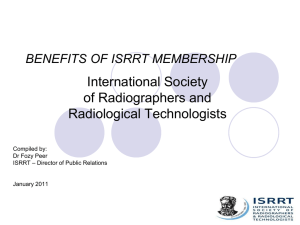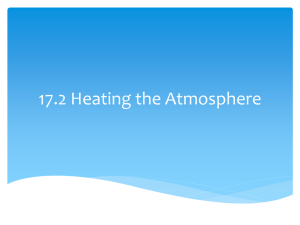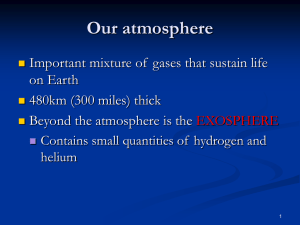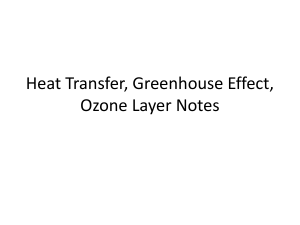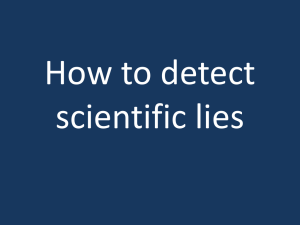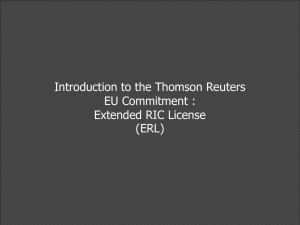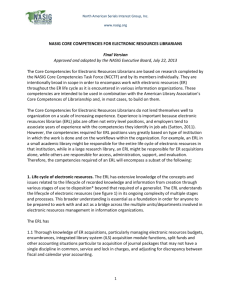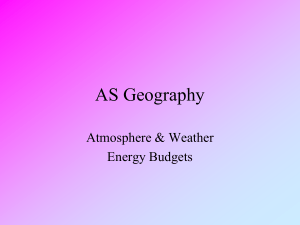Radiation Balance - Atmospheric and Oceanic Sciences
advertisement
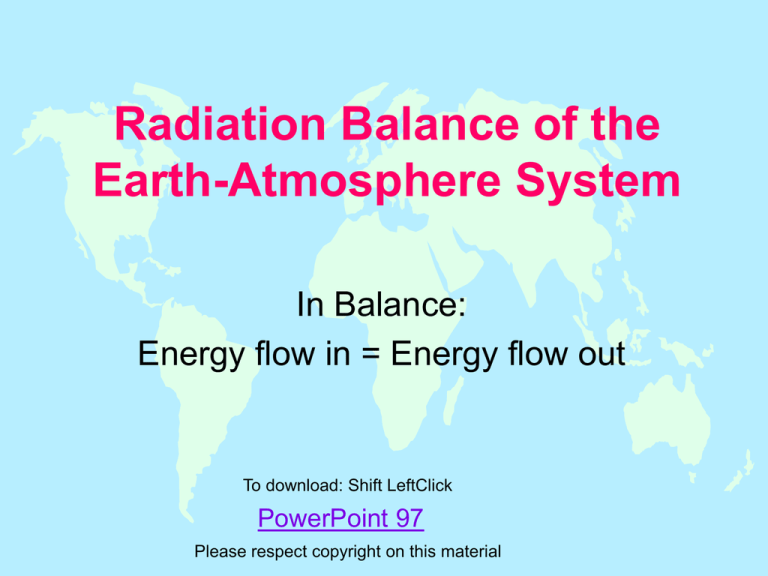
Radiation Balance of the
Earth-Atmosphere System
In Balance:
Energy flow in = Energy flow out
To download: Shift LeftClick
PowerPoint 97
Please respect copyright on this material
Reaction Topic
What
would be the impacts on life in
Wisconsin if the climate were 10oF
warmer year round?
Key Points
Climate depends on radiation from sun
– Sun higher above horizon in summer
=> more radiation per unit area of earth surface
– Atmosphere mostly transparent to solar
– Surface heating reduced by clouds & snow
Because CO2 acts like a blanket, surface and lower
atmosphere cool by infrared radiation to space from
upper troposphere (ERL= effective radiating level)
Increased atmospheric CO2 raises ERL, reducing
outgoing IR, until troposphere has warmed to
compensate
Ocean heat storage in ocean takes decades to come
to new balance
For given CO2 low clouds cool , high clouds warm
The Seasons
Madison
Equinox
Summer
The effect of distance
from the sun
Assumed
mathematics
– Sphere of radius r
Surface
area = 4 r2
– Disc of radius r
One
sided area = r2
Intensity
= Power received by object divided
by the area of object
= Energy flow / unit surface area
Radiation from the Sun
Intensity
direct from sun
= S / (4 R2) = 1368 W m-2
(the inverse square law)
Earth
Sun
R
r
S
Sphere
Intensity
over Earth
= 1368 r2 / (4 r2) = 342 W m-2
(averages time of day & latitude)
How Strong is the Sun at
Mars?
S
–
R
= total power emitted by Sun
output of nuclear furnace deep inside
= distance of Earth from Sun
Distance of Mars from Sun = 1.4 R
Direct Intensity = S / {4 (1.4 R)2}
= 1368 / (1.4)2 W m-2
= 698 W m-2
Sunlight is half as strong on Mars
.1
1
5
10
Wavelength (microns)
Microwave
.5
Infrared
Near Infrared
.0001
Visible
Ultraviolet
Electromagnetic Spectrum
10,000
Opacity of Atmosphere
(no clouds)
From Earth
From Sun
100 %
50
%
0%
0.07 0.1
0.3 0.5 0.7
5
10
Wavelength (micrometers)
15
20
Fraction of radiation absorbed by entire atmosphere (mostly in
the troposphere)
Horel & Geisler Chapter 3
Key Points
Climate depends on radiation from sun
Because CO2 acts as a blanket, surface and lower
atmosphere cool by infrared radiation to space from
upper troposphere (ERL= effective radiating level)
Increased atmospheric CO2 raises ERL, reducing
outgoing IR, until troposphere has warmed to
compensate
Because of heat storage in the ocean, the system to
takes decades to come to new balance
For given CO2 low clouds cool , high clouds warm
Solar Radiation Budget
Earth
100%
Incoming
as a whole
342 W/m2
Reflected
30.7%
Absorbed
69.3% 237 W/m2
105 W/m2
The Effective Radiating Level
ERL
ERL:
The lowest level in the atmosphere from
which infra red radiation is able, on average,
to escape upwards to outer space without
being reabsorbed
As concentrations of absorbing gases such
as CO2 are increased, the ERL rises,
decreasing the total mass of air above and
keeping the opacity of that air constant.
The intensity of the radiation emitted to space
increases with the temperature at the ERL
Temperature and Altitude
40 km
5% mass
30 km
Stratosphere
Little Mass to Absorb Radiation
Slow Overturning (years)
20 km
20% mass
10 km
75% mass
Tropopause
Troposphere
200 K
250 K
Convection
& clouds
300 K
Adapted from H & W Figure
Key Points
Climate depends on radiation from sun
Surface and lower atmosphere cool by infrared
radiation to space from upper troposphere (ERL=
effective radiating level, such that total CO2 above is
fixed)
Increased concentration of atmospheric CO2 raises
ERL, reducing outgoing IR, until troposphere has
warmed to compensate
Ocean heat storage in ocean takes decades to come
to new balance
For given CO2 concentration, low clouds cool , high
clouds warm
Absorbent Atmosphere
ERL
=Effective Radiating Level
Solar
Infrared
Tropopause
ERL
H2O, CO2, ...
Solar in = IR out
Temperature
Key Points
Climate depends on radiation from sun
Surface and lower atmosphere cool by infrared
radiation to space from upper troposphere (ERL=
effective radiating level, such that total CO2 above is
fixed)
Increased concentration of atmospheric CO2 raises
ERL, reducing outgoing IR, until troposphere has
warmed to compensate
Ocean heat storage in ocean takes decades to come
to new balance
For given CO2 concentration, low clouds cool , high
clouds warm
Greenhouse Warming:
a simple model
Hold absorption of incoming solar radiation radiation
fixed
Infrared radiation leaves earth for space from upper
troposphere (ERL). Amount increases with
temperature at ERL (immediate). Height of ERL is
such that total CO2 above it is constant.
Additional carbon dioxide mixes rapidly in
troposphere (weeks)
– ERL rises to where temperature is lower, less
outgoing radiation.,
Earth surface+ troposphere warms till outgoing
radiation from ERL balances incoming (years to
centuries)
Effects of Enhanced CO2
initial change in radiation
ERL
=Effective Radiating Level
Solar
Infrared
Tropopause
ERL
H2O, CO2, ...
Solar in = IR out
Temperature
Effects of Enhanced CO2
after rebalance
ERL
=Effective Radiating Level
Solar
Infrared
Tropopause
ERL
H2O, CO2, ...
Solar in = IR out
Temperature
Key Points
Climate depends on radiation from sun
Surface and lower atmosphere cool by infrared
radiation to space from upper troposphere (ERL=
effective radiating level, such that total CO2 above is
fixed)
Increased concentration of atmospheric CO2 raises
ERL, reducing outgoing IR, until troposphere has
warmed to compensate
Because of heat storage in the ocean, it takes
decades to come to new balance
For given CO2 concentration, low clouds cool , high
clouds warm
How long to achieve balance?
Land
surface
& atmosphere
~ 1 month
Ocean
surface layers
~ decades
Deep ocean
~ millenia
Key Points
Climate depends on radiation from sun
Surface and lower atmosphere cool by infrared
radiation to space from upper troposphere (ERL=
effective radiating level, such that total CO2 above is
fixed)
Increased concentration of atmospheric CO2 raises
ERL, reducing outgoing IR, until troposphere has
warmed to compensate
Heat storage in ocean takes decades to come to new
balance
For given CO2 concentration, low clouds cool , high
clouds warm
Effects of Low Clouds
reflect
sunlight (to space as well as to your
eyes)
reduce absorbed solar radiation
little effect on outgoing infrared
tend to cool the earth
Effects of High Clouds
reflect
little sunlight (hard to see)
are much colder than earth surface
absorb and re-emit outgoing infrared like
a greenhouse gas
tend to warm the earth
Earth
from
Space
Which
wins?
NASA
Sources of Information
Horel
& Geisler Chapter 2
